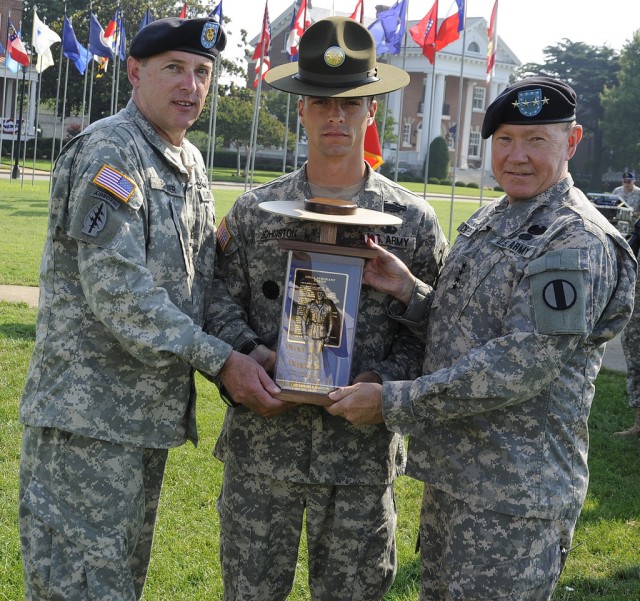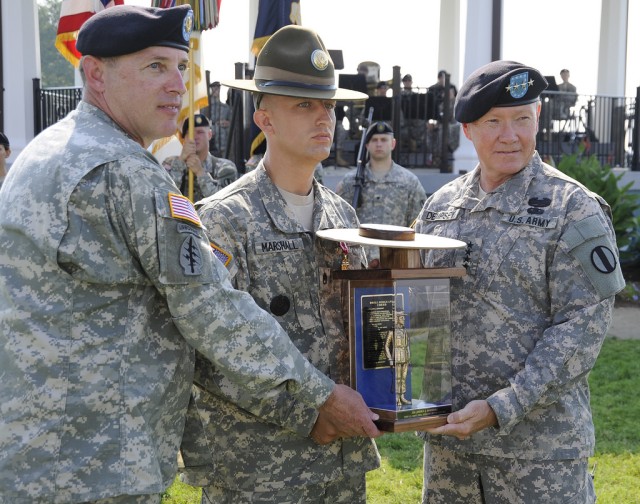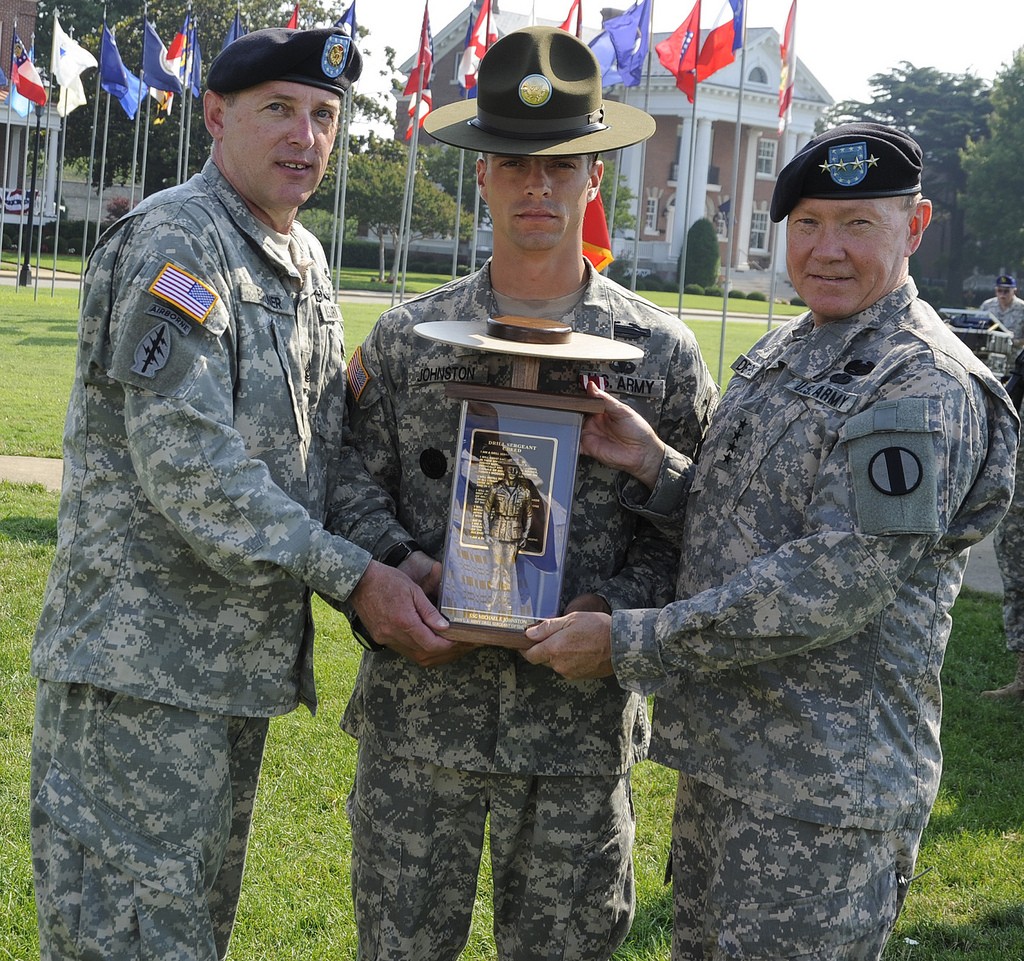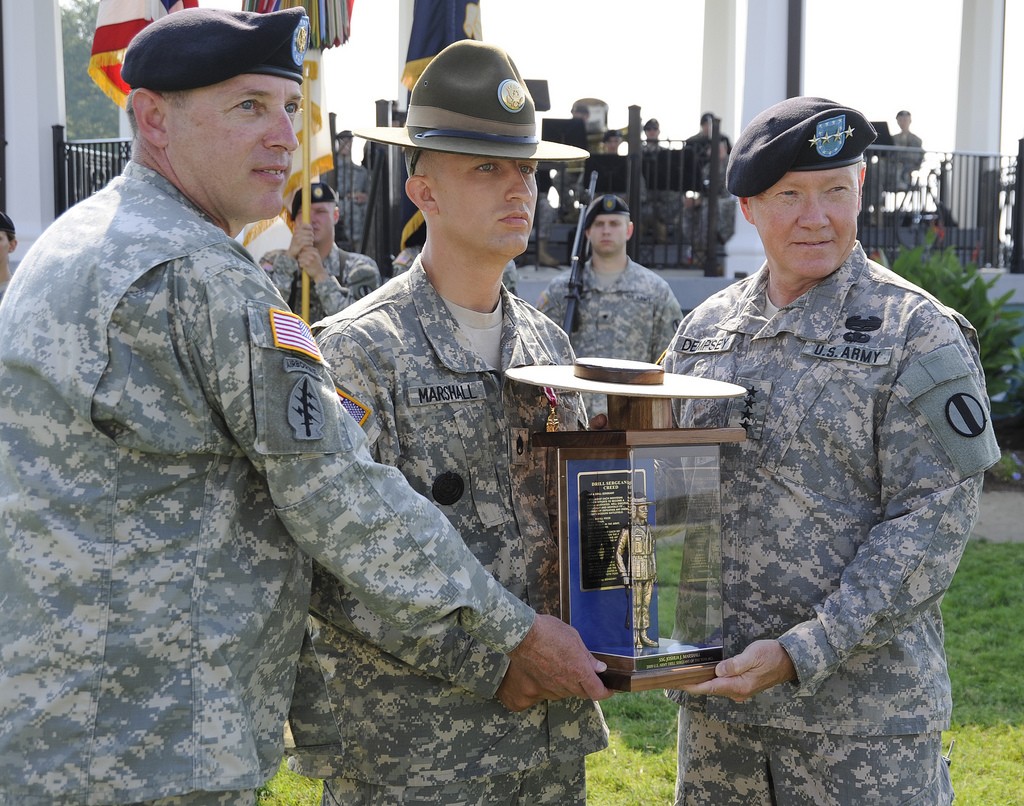FORT MONROE, Va. (June 11, 2010)-As their tenure as the 2009 Drill Sergeants of the Year draws to a close, active-duty Sgt. 1st Class Michael Johnston and Reserve Staff. Sgt. Joshua Marshall shared their experiences on how their lives had changed since the competition and their personal thoughts on drill sergeants, the quality of training and their time at TRADOC.
What are you taking away from being the 2009 Drill Sergeants of the Year'
JOHNSTON: What I'm taking away are my experiences with Big Army, my time with general officers [and] senior CSMs here at TRADOC. I got to see the bigger picture. As a drill sergeant, I always wondered what senior people did-do they really care about us and are they really looking out for our needs' I agree that the senior leaders at TRADOC honestly do care and work very hard. I think the two hardest-working people at TRADOC are [Gen. Martin E. Dempsey] and [Command Sgt. Maj. David M. Bruner]. They put in more hours and time assuring their people are squared away, which I think is setting the right example. Since I've been here, Command Sgt. Maj. Bruner has been gone a lot on TDY, checking on his TRADOC installations, and the commanding general is just as active. If you look at the hours that drill sergeants and [Advanced Individual Training] platoon sergeants put in, it's the same. They're away from their families, and I've gained a lot of respect for the senior leadership at TRADOC. They honestly are out there looking out for us and not just trying to make their career better.
MARSHALL: The biggest thing I learned this year would be how the whole Army works [through the lens] of TRADOC. My whole experience as a drill sergeant has been at Fort Knox, and now I have a better understanding about what happens at each of the [Army training centers]; the similarities and differences on how TRADOC and [initial military training] are working to create a [standardized] product through training. And the same thing as Drill Sgt. Johnston said: when you're working down at a company, you're going to get questions about this rule or why this doesn't change or when somebody's going to do something about that issue. Here, some of those things make sense on what it takes to change things. It's just made me a complete Soldier because it helps me realize how the Army works.
What's next after DSOY'
MARSHALL: On the Reserve side, I'll go back to my unit in Lexington, Ky. I have about nine more classes before I get my bachelors, and I want to go back to active duty as an officer, but I'm not sure what branch. I work for the Army at a depot in security and law enforcement, and I'll go back to doing that and being a Reserve drill sergeant. I guess the one thing that's really been emphasized here, and this has been a result of Lt. Gen. Mark Hertling [deputy commanding general for initial military training], is that basic training is not my platform or soapbox for me to tell privates what Drill Sgt. Marshall thinks is important, but your first job is to teach according to doctrine and what's written in the manual. He keeps emphasizing the Warrior Tasks and Battle Drills, but when it comes to the nine or 10 weeks of basic combat training, you have to stick to what the Army wants a private to learn so everyone is learning the same way. A lot of drill sergeants get caught up in [their deployment experiences], and that may mean nothing to some private who's going to be a cook at Fort Lee. That's not all bad, but when it's actual training time, you have to train what's in the book. I never really understood that before.
JOHNSTON: I won't be going back to TRADOC, I'll be going to [Forces Command], but what I'll bring is a better understanding and a better explanation to FORSCOM to explain why and how we get the product we get [regarding Soldier readiness]. I need to go back to FORSCOM and explain to my brothers and sisters out there that we're not always getting a "final product" out of basic training-we're getting a basic-trained soldier. FORSCOM has forgotten that, and they think they're going to be ready to go, ready to deploy. No problems, no issues, a 300-point [physical training] stud or studette. If you get a private with a PT score above 180 and a shooting qualification of 23, [having] memorized all the battle drills, then you have a plus right there. The second thing is my knowledge of why things they are the way they are. Why are these rules here' Why hasn't this changed' Why has it taken two months to get this thing signed-off' I won't have the answers, but at least I can provide an understanding to my brothers and sisters and bring clarity. The next thing is after working here, and getting some insight and listening to the senior generals and command sergeants major: I instilled values, but I didn't spend enough time on them. And I didn't harp on them. I was focused on Warrior Tasks and Battle Drills, rifle qualifications, harping on the things that any Soldier could be good at with enough training. But I wasn't harping on things that a Soldier needs most importantly, and that's values. I was very good at instilling discipline, without a doubt in my mind. (Laughs) But values' I didn't do it correctly. Looking back now, I think if I were to go back as a drill sergeant, which I would like to do after my next FORSCOM tour, I would be a better trainer and [more] efficient trainer, and it would save a lot of time.
What are some of professional and fun and rewarding things you've done as Drill Sergeant of the Year'
JOHNSTON: The most fun and the coolest thing was when we were called up by a first sergeant at Accessions Command at the Future Soldiers Center and we went down, and Drill Sgt. Marshall and I got to sit down and talk to the future soldiers. I thought it was really cool that someone remembered the DSOY from last year and brought us up again, and we got to answer questions for these privates entering the Army. I think we made a big difference, got a lot of stereotypes and questions out of the way, and we actually helped the drill sergeants out there who are going to receive these privates. The most proud thing was probably going with Command Sgt. Maj. Bruner down to [Association of the United States Army Winter Meeting] in Florida. When he calls you up and wants to check out the exhibits, he's letting you know - the second-highest-ranking enlisted person in the Army is letting you know - what he thinks about some of these new things coming out, his experiences. That was probably the coolest.
MARSHALL: I definitely enjoyed the untapped potential for drill sergeants to help with Recruiting Command. There tends to be a disconnect with the recruiters, especially if they've been there for a long time and are pretty detached from basic training. They haven't seen how much it's changed. So I think it would be smart to have the DSOYs do more stuff like that. I agree with Johnston that a fun experience was visiting the Army Experience Center. I think the thing that was most professionally rewarding was the hospital trip we did. I thought we were going to do more stuff like that with the disabled veterans, and I always enjoy stuff like that because those guys deserve the support. All the trips I've been on with IMT through the assessment visits. For me to go and learn and give the other drill sergeants someone to gripe to about the problems they've got was a good experience for me.
JOHNSTON: Oh yeah, and we got to go to the NFL Draft.
MARSHALL: I'm lucky I got to go. But we met Drew Brees, who was the coolest NFL player there. We got to hang out and talk to him and the commissioner.
What stereotypes and misconceptions are still circulated about drill sergeants'
MARSHALL: One of the stereotypes I hate, and it's partially true, is the whole thing about the kinder, gentler Army and basic training going soft. Obviously, it's way different from what it used to be, but for me as a drill sergeant - and from what I've heard from the other stations - basic training is not a walk in the park. If you have a good drill sergeant who can find creative ways to actually do training and impose discipline and standards, it'll be [a positive experience]. [Recruits] are not there to have a good time. The ones who are good and came in because they want to be trained love what they're getting; they love the training, and they're excited about it. And in fact, they enjoy it more because it's harder than they expected, and I think that's another misconception - that the Army has to get softer because kids won't come in if it's not softer.
JOHNSTON: If you have a good drill sergeant who's doing the right thing-discipline and training, and taking care of the Soldier-then basic training is not a walk in the park. Anyone who says it is either had a drill sergeant who didn't uphold the standard or they themselves are not holding up the standard. I think that's the biggest thing. You're always going to have one or two privates who say that basic training is a joke. You're always going to have superstuds, and - whatever you do - you're going to have privates who say it was hard, but again, basic training is basic. It should not be the hardest thing you go through in your life.
MARSHALL: At the same time, if you get the feedback, I'd say 75 to 80 percent of them would say that even if it wasn't the hardest thing they've been through in their life, they'd say it was life-changing. They actually feel like, "When I came in, I was a civilian, but now I actually feel like a Soldier."
What was your level of involvement in revamping the Warrior Tasks and Battle Drills'
JOHNSTON: We were at the IMT conference. Lt. Gen. Hertling invited us to attend and he brought in all different ranks, officers and [noncommissioned officers], all around the Army. We went through all the WTBD and took a consensus on what needed to be there. We had to fight for what we thought was important for Soldiers to know.
MARSHALL: It was really a restructuring because all the same tasks are there except for a few of them.
JOHNSTON: It was good because Lt. Gen. Hertling cut it down so Soldiers could at least memorize the tasks. I think this is a good start before moving into subtasks.
MARSHALL: I think a part of why they're restructuring it is because they weren't being trained adequately. And so I think it was almost a re-emphasis on what TRADOC wants as a product.
JOHNSTON: It's another way to get the Army on the same page and move away from teaching tactics, techniques and principals and combat lessons. To get one standard across the board that at least everyone will be measured to, the problem is that a lot of Soldiers are being sent to FORSCOM and are being trained differently. The thing is, I didn't even know about them before I became a drill sergeant. I stayed with my infantry battle drills, my 7-8.
And a lot of the drills didn't even match. So you had a bunch of drill sergeants teaching what they know. Certain manuals don't mix. The Soldier's handbook had a lot of information that was incorrect. For example, characters of the M240B didn't match the FMs. So you have different manuals and what am I, as an NCO, going to teach off of' An initial-entry manual' Or am I going to teach off of the field manual that the United States Army puts out' I'm going to teach off of the field manual.
MARSHALL: Lt. Gen. Hertling has emphasized strict doctrine adherence. He wants people teaching what the doctrine says. I don't have a problem with that as long as I know that's what expected. But if there are three different manuals that say something different, you're going to teach your private what will benefit them in the field.
JOHNSTON: [Lt. Gen. Hertling is] going to take it where it needs to be and get it back to a consistent doctrine. When he goes down to an installation, he doesn't budge. Everyone has to be on the same page. For basic training, you're going to have the same product, and I think that's the coolest thing.
What can you tell me about the 2010 Drill Sergeant of the Year competition'
JOHNSTON: This is a competition. That's what it is. The board is only 15 minutes of the whole event. What we're trying to do is pick a representative who will represent all the active and Reserve [sergeants, staff sergeants and sergeants first class]. It's very important we get this right. That's why it's a competition and not just a board. If you win that competition, you deserve it without a doubt. There's no one who can tell you differently. The competition has so many events. Through all the drill sergeants who compete, you earn that title. We're asking for the best of the best.
Do you have any closing comments'
JOHNSTON: I think we as drill sergeants continually need to remind ourselves of what we do. We instill discipline [and] reinforce standards, and we train soldiers. That's our job. Right now as drill sergeants, I see the biggest problem is that drill sergeants think they need to go home at 4:00 at night and their day is over. I know guys who have worked from 4:30 a.m. to nine at night. But there's one drill sergeant with that platoon from Day One. I think the thing drill sergeants can improve on are the things we can control. I've heard a drill sergeant say that privates have no discipline, but that private doesn't stand at parade rest for that drill sergeant. Why didn't he correct it there and then' I think we as drill sergeants need to get better at instilling discipline, setting the standard, training to the standard and professionalism. We kill ourselves with the rules because those are the things that we've messed up before, but everything is put into place to protect us and others.
MARSHALL: I'm not a big creed or motto person, but I know in the NCO creed it says that "I will not forget and I will not let my comrades forget that we are noncommissioned officers." I've been guilty of that myself, but even those who uphold the standard go home and complain about those who don't. Well, why didn't you call him on it or say something about it' And even if they outrank you, you need to be respectful about it, and if they're lower ranking, then it becomes your responsibility to correct them and fix it with them. But we need to get to a point where we hold each other accountable to the standard. I think that's going to make or break our Army in the future.
To learn more about the 2010 Drill Sergeant of the Year Competition, June 14-18 on Fort Monroe and Fort Eustis, Va., go here: <a href="http://www.army.mil/drillsergeant" target="_blank">http://www.army.mil/drillsergeant</a>
Related Links:
The 2010 Drill Sergeant of the Year webpage




Social Sharing